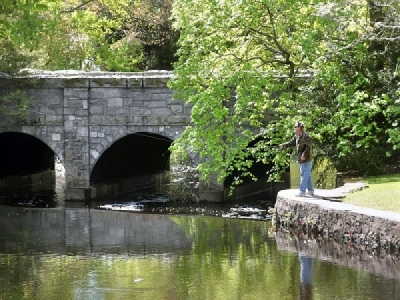
Posted on January 9, 2018
By John Burgeson, ctbulletin
The recent bout of frigid temperatures are delaying the long-awaited start of the so-called duck pond dredging project.
Director of Public Works Director Chris Saley said the days of below-freezing temperatures is “making it impossible” for crews to begin removing silt and muck from the three picturesque duck ponds in the city.
“I’m afraid that we’ll just have to wait until it warms up a little,” Saley said. “Dredging a pond when the overnight temperature drops to the teens and below is out of the question.”
The project was supposed to begin in early November, but there was a delay in delivery of turbidity curtains, according to Mayor Benjamin Blake. The curtains are needed to keep silt, stirred up by dredging, from washing downstream into Milford Harbor. This, officials said, was the reason behind the project in the first place — to keep the harbor from silting up prematurely.
The turbidity curtains have since arrived, but that was about when the temperatures began to settle below the freezing point more-or-less all the time.
The three ponds are the North Street Pond, the City Hall Pond and the pond behind the Stonebridge Restaurant. All three are along the Wepawaug River, which empties into Milford Harbor. They haven’t been dredged since the 1970s, city officials said. They’ll begin with the North Street Pond, where equipment is already in position, ready to go when the temperature cooperates.
The city has borrowed $2 million for the project. It’s hoped that a fourth pond, the one in Eisenhower Park, can be dredged at some point in the near future, but the $2 million won’t be enough to add a fourth pond.
City officials have spent months on end securing the necessary permits from the state Department of Energy and Environmental Protection; the contract for the project is 350 pages long, dealing with everything from the protections of reptiles and amphibians to the proper handling of the excavated muck.
The silt, mud and muck will first have to be “dewatered” on the shores of the ponds — that is, allowing its water to flow back into the pond, which requires above-freezing temperatures. Then, it’ll be trucked to a site on Oronoque Road, near the transfer station. In all, 15,000 cubic yards of material will be removed from the three ponds.
The ponds have silted up to the point where it appears that waterfowl are “walking on water,” according the Mayor Blake. As for the Canada geese — the nonmigratory subspecies — officials have been frustrated by their persistent loitering on city property. Several strategies have been attempted over the years to get them to move along, but they remain entrenched.
In mid-2016, Milford Harbor was dredged in a $600,000 project, the first time since 1986.
Source: ctbulletin





